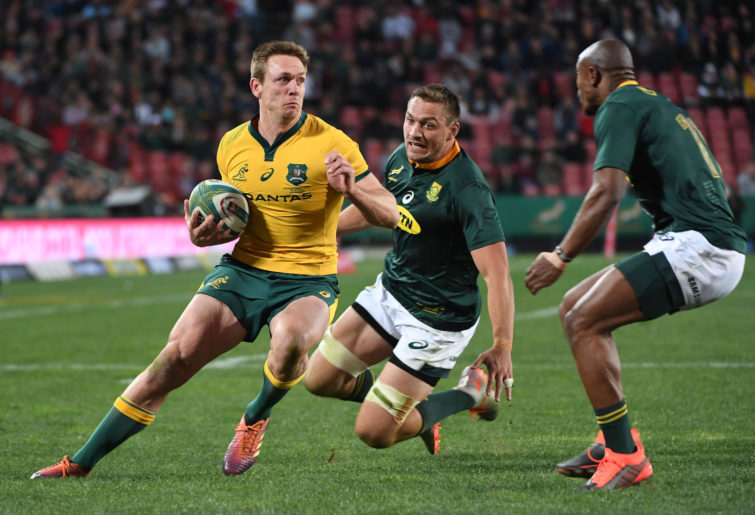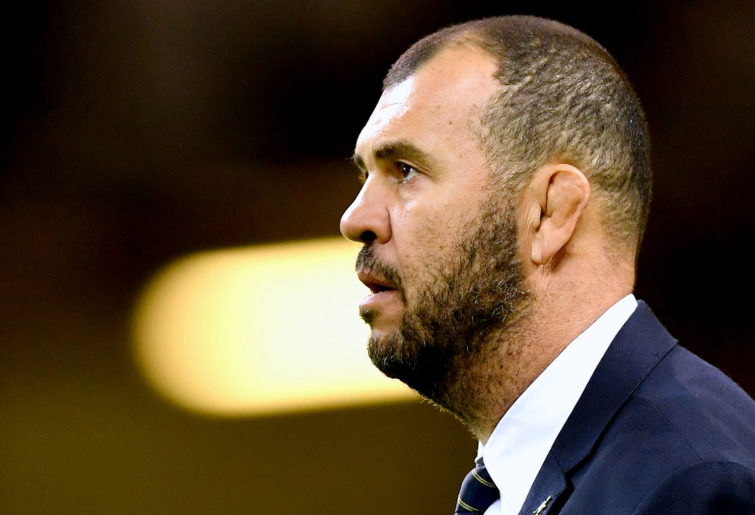South Africa scored a bonus-point 35-17 victory over a woeful Wallabies side at Ellis Park in Johannesburg in the opening round of the 2019 Rugby Championship.
Here is a trick question. Which coach of the contesting teams made these statements?
Quote no.1: “We know that this was not a world-class performance, not even close. The way we played today won’t get us into the World Cup playoffs. There was some rustiness and all our combinations weren’t settled.”
Quote no.2: “We created a lot of good opportunities and we gave a couple away as well but sometimes you got to be able to react. A lot of small things went against us in that period as well that turned the momentum away. I was happy that a lot of the things we’ve been working on we were able to bring out there.”
Quote no.1 was Rassie Erasmus, the coach of the Springboks, being realistic about the performance of his team against a poorly coached and spiritless Wallabies side.
Working for the Springboks was the Ellis Park hoodoo.
The ground is the spiritual home of the Springboks in the same way as Eden Park is for the All Blacks.
The Wallabies have played ten Tests at the ground now. They have won once back in 1963.
Rassie Erasmus was taking a risk, though, in sending a group of his usual starters to New Zealand so that they could prepare for next weekend’s Test against the All Blacks.
To compound this disadvantage, Elton Jantjies was selected at no.10, despite the fact he hadn’t started in a Test win since August 2017.
And to further disadvantage the Springboks, a new cap – Herschel Jantjies – started in the crucial halfback position.
Elton under-played his hand to the benefit of the Springboks. He kicked well in converting all the tries and out of hand. He resisted doing the loopy plays that virtually always end up hurting his team more than the oppositon.
Herschel Jantjies was outstanding. He made a nerveless and thoughtful debut that was marked by a keen awareness of exploiting opportunities that opened up during the run of play.
He totally outplayed Nic White, who was slow in his passing and tended to kick away too much good ball.
Towards the end of the Test, for instance, he noticed that Dane Haylett-Petty had left the Wallabies blindside unguarded. The Wallabies winger carelessly put a shoulder into a ruck, even though the Springboks had secured the ball.
The youngster noted the mistake and scooted down the sideline for an audacious try.
Despite Erasmus’ caution and the caveat of the Ellis Park hoodoo, you would have to be impressed enough with the back-up Springboks to make the claim the Boks are back.

(Photo by Lee Warren/Gallo Images/Getty Images)
I would make one further point that is very topical right now. The 2019 Springboks are practising true diversity, with their mix of all the racial and religious groups in South Africa in the side.
This brings us to Michael Cheika and his poorly coached Wallabies.
If we go through more of Cheika’s comments after the Test, we see a coach in total denial of the reality of how poorly-prepared the Wallabies are, and what a dispirited side they seem to be.
Here is more Cheika nonsense: “I know (they scored) five tries but our defence was good in a lot of the phase play as well.”
Good defensive systems do not concede five tries.
The Wallabies’ defensive system involved no line speed to put pressure on the handling side. There were several occasions when the play was moved at close quarters out along the Springboks backline and not one tackle was made.
The contrast with this lazy defensive system of just tracking the ball handlers was in stark contrast with the energetic line speed demonstrated by the Springboks.
The Wallabies were frequently tackled and driven back well behind the advantage line. This rarely happened with the Springboks.
Admittedly, the Wallabies were playing a back-up set of props trying to adjust to new scrum regulations. But the scrum was wonky for most of the game. Moreover, elementary mistakes like the flanker coming off a scrum too quickly and exposing his prop to extra pressure were made too often.
The Wallabies conceded too many penalties when they needed to exert some attacking pressure.
This is a flaw in their play that seems to have carried over from 2018. Greg Clarke in commentary noted that last year the Wallabies won the penalty count in only one Test.
And then, what happened to the two-week stay for most of the squad in South Africa, a measure designed to ensure the team’s fitness at altitude?
The Wallabies forwards, who were far more impressive than the backs, won 60 per cent of possession in the first half.
But the team clearly ran out of gas, at altitude, in the second half.
In the first 20 minutes of the second half, the Springboks ran for 155 metres and the Wallabies ran for five. Five metres!
The Springboks scored three converted tries to one converted try by the Wallabies in the second half.
You have to wonder what Michael Cheika is telling the players at half-time for their game to deteriorate so badly in the second 40 minutes of play.

(Photo by Dan Mullan/Getty Images)
Finally, when is Michael Hooper going to get the message that when you are so close to the posts you can head the ball over, you take the kick!
Admittedly, the Wallabies earlier on in the first half did turn down a reasonably easy kick at goal and did score from a five-metre lineout.
But virtually on half-time, down by only four points right in front, take the points!
Even Tim Horan, a consistent optimist about rejecting the kick at goal and going for a try, insisted that Hooper had no option but to kick for goal.
Hooper told journalists that: “We won the scrum, we just had to get it out and it’s a try. If you’re a gambling man that’s a small bet.”
But the scrum was won, the Wallabies stuffed up a number 8/halfback move and the Springboks won a clearing penalty.
These are all matters that Cheika should have discussed openly at the media conference.
Instead, we got the usual pollyanna nonsense about “good signs” and “I was happy that a lot of the things we’ve been working on we were able to bring out there.”
Memo to coach Cheika: you might have been happy, but supporters are angry at another sub-par, emotionless, brain-dead Test from a clueless Wallabies side.
Then to cap off the now-traditional Wallabies mediocrity on the field, Cheika unleashed one of his traditional after-Test whinges.
In the 54th minute of play, with the Wallabies on attack, Taniela Tupou launched himself like a missile to clear out – blast out more likely – a ruck.
As Tupou was in his run-up for his missile launch, referee Paul Williams blew his whistle.
The ruling of the referee was that the hit was made after he blew his whistle. This made the hit a dangerous one. Therefore, a yellow card had to be handed out.
This was the correct ruling.
Enter Michael Cheika into the controversy: “I make it a wrong call. The other guy should have been sent to the sin bin. The fourth office said he focused on the green player who came in with a shoulder charge. Taniela then came in after that to get him with his arms wrapped at the right height.
“I’m not sure if big contact is a penalty these days but that’s a wrong decision.”
Cheika clearly either disregarded or did not hear the referee explain that the fact that the hit was launched after he blew the whistle, and when the hit player was exposed to an injury.
But he was prepared, without even considering all the facts, to publicly bag the referee.
This is madness, and an action that brings Rugby Australia – Cheika’s employer – into disrepute.
The important point to remember here is that Paul Williams is one of the designated referees at the 2019 Rugby World Cup.
Remember, too, that the Wallabies are consistently conceding the penalty count to their opposing teams.
Is there any link, perhaps, between Cheika’s repeated denigration and abuse of referees and lopsided penalty counts against his team?






























































































